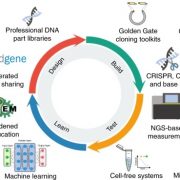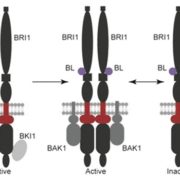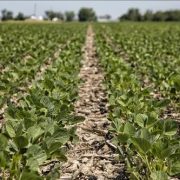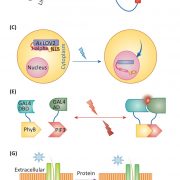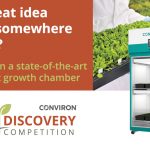Interviews with synthetic biologists: Tobias Erb
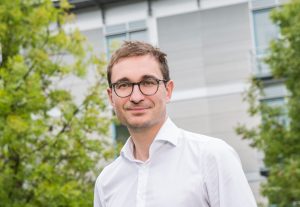 Synthetic biology is a set of tools, a way of thinking, the integration of engineering principles into biological sciences, and potentially the biggest opportunity for advances in plant sciences since PCR. Yet many struggle to define it, and fewer still grasp its full potential.
Synthetic biology is a set of tools, a way of thinking, the integration of engineering principles into biological sciences, and potentially the biggest opportunity for advances in plant sciences since PCR. Yet many struggle to define it, and fewer still grasp its full potential.
Now, four early-career synthetic biologists have conducted a set of video interviews with leaders in the field of plant synthetic biology, in both academic and industrial arenas.
In the fourth of the series Interviews with Synthetic Biologists, Jenna Gallegos, a postdoc at Colorado State University, interviews Tobias Erb.
Professor Tobias Erb is the Director, Max Planck Institute for Terrestrial Microbiology in Marburg. His lab aims at understanding and applying the fundamental design principles of metabolism. On the one hand they study the function and organization of natural metabolism in the context of the living cell. On the other hand, they use their understanding to build novel, synthetic metabolism in a bottom-up fashion.
Some of his recent work in synthetic biology:
- Back to the future: Why we need enzymology to build a synthetic metabolism of the future. (2019) Beilstein J. Org. Chem. 2019, 15, 551–557. doi:10.3762/bjoc.15.49
- ‘Negative’ and ‘positive catalysis’: complementary principles that shape the catalytic landscape of enzymes. (2018) Curr Opin Chem Biol. 47:94-100. doi: 10.1016/j.cbpa.2018.09.013
- Synthetic metabolism: Metabolic engineering meets enzyme design. (2017) Curr Opin Chem Biol. 47: 56-62.doi: 10.1016/j.cbpa.2016.12.023
- A synthetic pathway for the fixation of carbon dioxide in vitro. (2016) Science 354:901-904
Excerpts (lightly edited) from the interview
Can you tell us about your work?
We’re trying to reinvent CO2 fixation, by taking natural processes like photosynthesis, trying to identify bottlenecks in photosynthesis, and find completely new solutions using synthetic biology.
How do you define synthetic biology?
Using the natural building blocks provided by nature, and trying to create something that is new to biology – overcoming the bottlenecks of evolution.
What emerging technologies are you most excited about?
One is our capacity to evolve completely new enzymes and proteins, to expand the biochemical space. The other is being able to implement them through genome editing technologies, which allows us to implement these new building blocks in living organisms.
What kind of work do you expect to be featured at the Plant Synthetic Biology meeting?
What I want to show is our approach to reinvent photosynthesis, using enzymes that are faster and more accurate than Rubisco. Also, how we can design new CO2 fixing enzymes from scratch.
What are the biggest challenges?
In vitro we can demonstrate more efficient CO2 fixation. The challenge is to reproduce these new pathways in plants, including to direct new enzymes to different compartments. This is a big challenge – can we rewire metabolism in plants.
Can you tell me about your outreach efforts?
We have to activate young people to get them excited about science. We have to provide enough food and become a CO2-neutral society and these things can potentially be solved through synthetic biology. But you need to get the students engaged in using these technologies and to think about the future applications of synthetic biology.
What should people know about plant synthetic biology?
Plants are only one way evolution has come up with. As biologists we can build now new ways – eventually better plants for a better future.
Advice for students
I come from a time when biology was very descriptive. This has now shifted, and biology has become a really synthetic discipline which means we can build our own pathways. My team is able to build these pathways to see how they would perform inside living organisms. It’s exciting times in biology. The limit is now your imagination, it’s not the technology. It’s what you can create in the lab.
Outreach:
Toibas Erb – The CO2 Wrangler (Chemical and Engineering News, “The Talented 12, 2015).
Tobias Erb on Designing a More Efficient System for Harnessing Carbon Dioxide
Synthetic Biology: Realizing synthetic carbon dioxide fixation – Tobias Erb
Jenna Gallegos joined the Peccoud Lab at Colorado State University as a postdoc in 2017. Jenna got her PhD in plant biotechnology at UC Davis where she studied gene expression in Arabidopsis. Her work as a postdoc focuses on high-throughput yeast genetics and developing tools for strain and sequence verification. In addition to skills in molecular biology, Jenna is an avid science communicator. She tweets, blogs, makes videos, writes science-based news articles, and serves as the news editor for the Oxford Journal Synthetic Biology. Before coming to CSU, Jenna interned as an ASPB-sponsored AAAS Mass Media Fellow at The Washington Post and on the BioDirect team within Monsanto’s Ag Productivity Innovations Organization in Woodland, CA. Follow Jenna on Twitter at @FoodBeerScience.
Previously in this series:
- Steven Burgess interviews Professor Jennifer Nemhauser, University of Washington.
- Steven Burgess interviews Michael Mendez, Renew Biopharma.
- Steven Burgess interviews Matthew Mattozzi, Conagen Inc.
Stay tuned for more in this series of Interviews with Synthetic Biologists.




